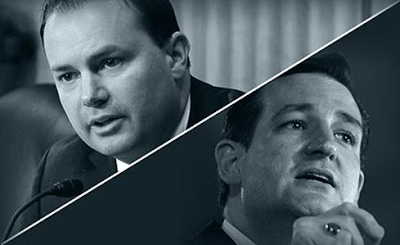GOP game plan: Now, the midterm elections are over. Let the harm to the nation begin.
What a difference a few days make. Very quick run-down here, on some key issues, before and after November 4.

Circuit Judge Jeffrey Sutton before the Senate
On gay marriage:
Opposing a national trend and many better-qualified judges on the bench, two rightwing judges ban gay marriage in four states. In case you had not noticed, the cases were filed in 2012; argued in 2013; proceeded in 2014. The opinion was announced after our midterm elections. More on the decision here. It was written by George W. Bush appointee Jeffrey Sutton, joined by Bush appointee Deborah Cook. A quick glance at their ideological track record tells the story.
One other thing these two Circuit Court judges have in common is that neither received Senate confirmation, after being nominated to the court by GWBush, until a post-9/11 Republican Senate, presided over by Vice President Dick Cheney, was in position.
So, to all the depressed-turnout voters who just sat out the midterm election in Michigan, Ohio, Kentucky, and Tennessee who have now lost another round: bear in mind that whom you elect to Congress matters, in off-years as well as in presidential election years.

Senator Mitch McConnell, appearing in public
On the Affordable Care Act:
Speaking of coming out, House Speaker John Boehner and probable Senate Majority Leader Mitch McConnell have now exposed themselves in the Wall Street Journal. Yes, Virginia, McConnell is going to try to repeal the Affordable Care Act.
Contrary to what McConnell said on Fox News television a week before the election, he’s going after Obamacare.
I suppose the only real question is why Roll Call covered for McConnell, giving further play (and credibility) to his falsehoods on television:
“Updated 9:35 p.m. | Senate Minority Leader Mitch McConnell says Republicans won’t be able to repeal Obamacare [sic] anytime [sic] soon.
Tempering the expectations of conservatives a week before the elections that could install him as the first Republican majority leader in eight years, the Kentucky Republican said in a Fox News interview Tuesday a repeal of the health care law simply wasn’t in the cards for now.
He wasn’t telling Fox News anything that close observers of the Senate and the budget process didn’t already know, but it serves as a reminder of the limitations Republicans should expect even if they net six or seven seats, given the obvious reality that President Barack Obama is still in the White House.”
Actually, that is not a real question. It is a rhetorical question; Roll Call is pro-GOP, not nonpartisan.
Anyway, to all of the voters in Kentucky who sat out the election figuring that at least McConnell would be smart enough not to try to destroy every attempt at health insurance reform: you just lost another one.
This is what you get when you rely for ‘analysis’ on paid shills or media-outlet groupthink, whether at Roll Call or in the big-city daily newspapers or on NBC.
The problem goes back a few years. With the amnesia typical of political coverage, few media outlets recall (or reveal) the political temper dominant in the news media only ten years ago. So simple, so forgotten: A candidate who mentioned that people ought to be paid a day’s wage for a day’s work was laughed out of town, or ignored. (Who could win with an argument like that?) It was largely Barack Obama who up-ended that political worldview, somewhat as J. K. Rowling up-ended the conventional wisdom that ‘young people don’t read’, and (much earlier) Dr. Seuss up-ended the notion that children’s books had to be eye-glazingly dull.
There are some small enclaves in the national political press who will never forgive him. Sorry, but some people are more threatened by merit than supportive of it. When times are tight, those individuals tend to get worse, not better.
Note to human beings: the ‘smart money’ is usually wrong, at least when the smart money comprises a small number of under-qualified and over-promoted individuals in a declining profession–whose decline was brought about largely by their own misdirection of resources.
I say this with love.
Once again, dear friends: when, between c. 1980 and 2006, did you ever see insurance industry problems/abuses/outright fraud discussed with clarity and focus in national political coverage?
More later.







